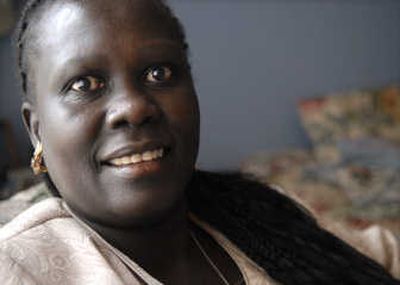A new life after a rescue from the grave

Editor’s note: American stories is an occasional series about immigrants who have left their homelands to make our community their new home.
“God saved me from the grave for a reason,” said Ariet Oman, a handsome and statuesque Ethiopian woman.
When Ariet was born, maybe about 40 years ago – she did not know for sure – her mother died in childbirth. Unable to raise her, the family buried Oman alive alongside her mother. A stranger witnessed the burial, dug her out and gave the newborn to a missionary, who gave the baby to a woman of the Anuak tribe in the Gambella region of western Ethiopia.
The woman loved the child despite the tribe’s rejection of the adoption. Most importantly, she supported Oman’s pursuit of an education, something rare in that region at the time and almost unheard of for a girl. Girls were thought unworthy of an education, and a girl seen running around in public was thought a shameful sight.
Oman endured all kinds of humiliation and insults for being in school. But she and her mother persevered, and Oman proved to be an excellent student. Through hard work and determination she won scholarships to stay in school. After 10th grade, her education was cut short by the government, which forced her to work as a poster child for the progressiveness of the government’s education policy.
“They want to show me off that a girl can get an education,” Oman said. “I had no other choice. It was either work at the job that the government forced upon me or to go to jail.”
She worked as a cashier and studied at night to put herself through the 12th grade. She was one of three girls in a class of 40 boys in the only high school in the region.
To pursue a college education, she decided to cross the border to Sudan, but along the way got caught in the crossfire between regional tribal rebels and government soldiers. The Gambella People’s Liberation Movement was a local tribal group fighting to free Gambella from the rule of the communist government.
“They did not harm me because they were from my region,” Oman said. “They were my own people.”
But she was held captive as a trophy and used as poster child of the GPLM’s propaganda.
“They want to show me off to the people and say: Look, we have the most-educated woman in the region with us in the movement. She believes in our cause! Come join us!”
For four months, Oman slept in a shallow pit in the bush, “just deep enough to lie flat on the back and not on the side,” she recalled. “If you turned on your side, the bullet might hit you.”
Although Oman was sympathetic to the rebels, theirs was not her cause. She wanted a college education. She wanted to be able to make a living with her mind. And above all, she wanted to be an independent woman who would not perpetuate the culture of female submission and subservience. For four months she talked about going to Sudan, and finally one night, an armed escort took her on a three-day trek.
That was in 1987. She worked for two years in Sudan as a radio host broadcasting anti-communist propaganda back to Ethiopia. She worked alongside men doing interviews, writing, editing and hosting the weekly radio show. It was a remarkable feat for a tribal woman.
In 1989, Oman arrived in Spokane as a refugee, sponsored through a family from First Presbyterian Church, “with my 12th-grade diploma and the clothes on my back.” And a few words of English.
Today, Oman is the co-founder of Anuak Meer Ministry, a ministry of the First Presbyterian Church that is dedicated to the welfare of women and children in Ethiopia’s Gambella region.
“I believe that education and small-business ownership is the only way we can help them,” she said. “God saved me from the grave for a purpose. And that purpose is to give back to Anuak culture, to help the women and orphans left behind by wars, famine and diseases.”
After 18 years, Oman still marvels at the road she has come. She gives thanks daily to the freedom she enjoys, the possibility of life, and above all, the choices that women have in this country.